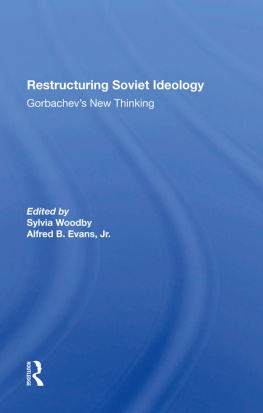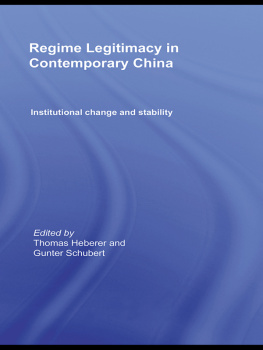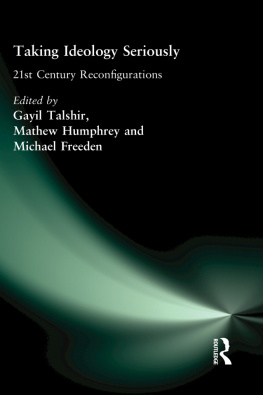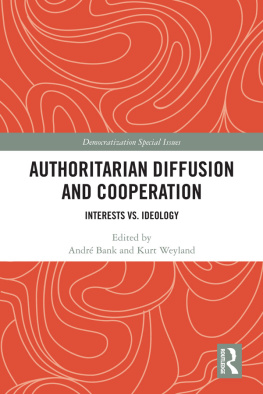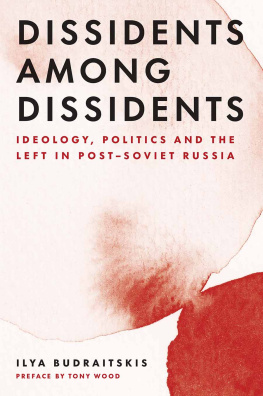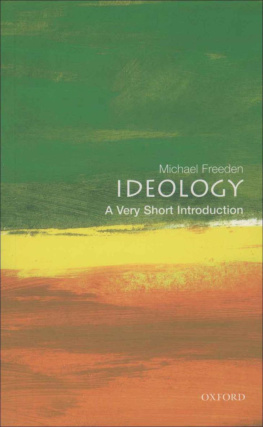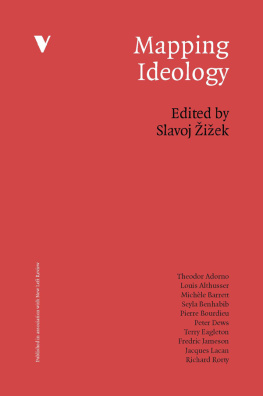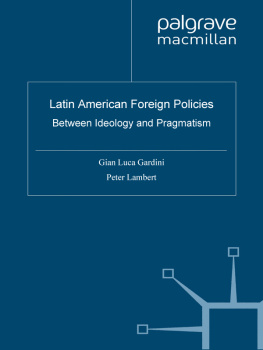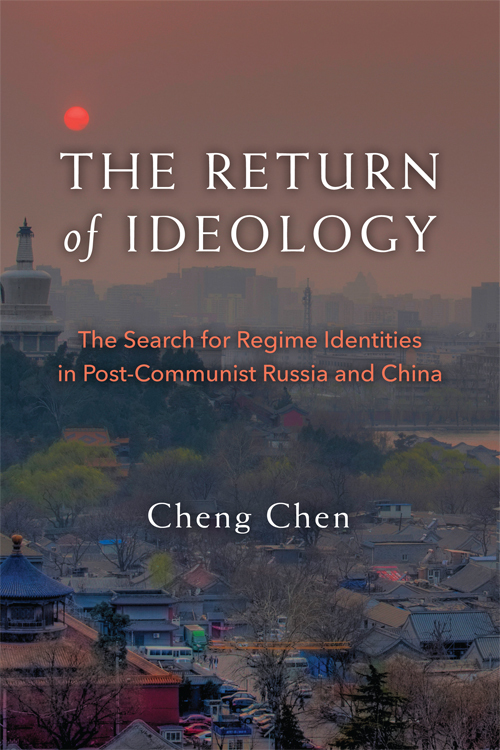
The Return of Ideology
As a nation makes the transition from communism to democracy or another form of authoritarianism, its regime must construct not only new political institutions, but also a new political ideology that can guide policy and provide a sense of mission. The new ideology is crucial for legitimacy at home and abroad as well as the regimes long-term viability. Comparing postcommunist regimes, with a focus on Russia under Putin and post-Deng China, Cheng Chen investigates the factors that affect the success of an ideology-building project and identifies the implications for international affairs.
Successful ideology-building requires two necessarybut not sufficientconditions. The regime must establish a coherent ideological repertoire that takes into account the nations ideological heritage and fresh surges of nationalism. Also, the regime must attract and maintain a strong commitment to the emerging ideology among the political elite.
Drawing on rich primary sources, including interviews, surveys, political speeches, writings of political leaders, and a variety of publications, Chen identifies the major obstacles to ideology-building in modern Russia and China and assesses their respective long-term prospects. Whereas creating a new regime ideology has been a protracted and difficult process in China, it has been even more so in Russia. The ability to forge an ideology is not merely a domestic concern for these two nations, but a matter of international import as these two great powers move to assert and extend their influence in the world.
ChengChen is an Associate Professor in the Department of Political Science at the State University of New York at Albany.
The Return of Ideology
The Search for Regime Identities in Postcommunist Russia and China
Cheng Chen
University of Michigan Press
Ann Arbor
Copyright by Cheng Chen 2016
All rights reserved
This book may not be reproduced, in whole or in part, including illustrations, in any form (beyond that copying permitted by Sections 107 and 108 of the U.S. Copyright Law and except by reviewers for the public press), without written permission from the publisher.
Published in the United States of America by
the University of Michigan Press
Manufactured in the United States of America
A CIP catalog record for this book is available from the British Library.
ISBN 978-0-472-11993-6 (hardcover : alk. paper)
ISBN 978-0-472-12199-1 (e-book)
For Katsuya and Yuzuki
Contents
This book has benefited enormously from advice and comments that I received from various colleagues over the years. In particular, Rudy Sil, Veljko Vujacic, and two anonymous reviewers read through the entire manuscript and offered detailed and invaluable comments, which helped me greatly in improving the quality of the manuscript. Other colleagues that read parts of the manuscript and offered helpful comments include Victor Asal, Zsofi Barta, Peter Breiner, Mark Baskin, Sally Friedman, Avery Goldstein, Karrie Koesel, Julie Novkov, and Meredith Weiss. I would also like to acknowledge the contributions of several of my doctoral students at the State University of New York at Albany. Turkhan Sadigov and Xiaoye She commented on parts of the manuscript, and Yeufen Hsieh and Inga Miller provided research assistance.
I am grateful to the Department of Political Science at the State University of New York at Albany for providing a nurturing and stimulating intellectual environment and generously sponsoring a book workshop for me. The book had also been supported by a Faculty Research Awards Program, Category B research grant from the University at Albany. I am much indebted to my editor at the University of Michigan Press, Melody Herr, whose encouragement, guidance, and professionalism have been indispensable in the final publication of this book. My thanks also go to Marcia LaBrenz at the University of Michigan Press; John Raymond for copy-editing; and Eileen Doherty-Sil for indexing.
Earlier versions of some of the material in this book have previously been published in an article, Muddling through the Shadow of the Past(s): Post-Communist Russias Search for a New Regime Identity, Demokratizatsiya 19, no. 1 (Winter 2011): 3757. I thank the journal for granting me the rights to use these elements.
Finally, this book would not have been possible without the love and support from my parents in China and my family here in the United States. I dedicate this book to Katsuya Izumi, who has been the backbone of our family, and our daughter, Yuzuki, who arrived during this books writing and has since then brought us so much delight and joy.
AIIB Asian Infrastructure Investment Bank
CCP Chinese Communist Party
CEE Central and Eastern Europe
EU European Union
FSB Federal Security Service (Russia)
GDP gross domestic product
NATO North Atlantic Treaty Organization
PRC Peoples Republic of China
USSR Union of Soviet Socialist Republics
VTsIOM Russia Public Opinion Research Center
Introduction
More than a quarter century after the fall of the Berlin Wall, the United States status as the leader of capitalist liberal democracies and the dominant global power remains unchallenged. But the efforts spearheaded by the United States to spread liberal democratic values around the world have apparently stalled despite the sweeping forces of global capitalism. Even as debates continue over who gets the credit when it comes to bringing down communism,
Historically, capitalism shares a close if not intrinsic link with democracy. Against such a background, the continuing rise of authoritarian China and the failure of democracy in Russia appear particularly disconcerting for those who had subscribed to such a definition. After abandoning the old communist developmental path and embracing capitalism, the two largest postcommunist countries, which together control a huge land mass in Eurasia and account for more than one-fifth of the worlds population, so far show few signs of being on their way to becoming liberal democracies. Instead, the combination of capitalism and political authoritarianism seems to have stabilized in both China and Russia, giving rise to the increasing prominence of the idea of authoritarian capitalism.
The idea of authoritarian capitalism itself, however, does not tell us much about these regimes and their respective developmental strategies. Authoritarianism, as a huge residual category, encompasses a wide and diverse range of regimes that are not democratic. But plenty of authoritarian regimes failed, and still fail, to develop economically. There is simply nothing theoretically or empirically to suggest any intrinsic relationship between political authoritarianism and capitalist economic development. The mere combination of authoritarianism and capitalism, therefore, hardly constitutes a developmental model.
Distinctive from the democratic capitalism of the West, the current postcommunist authoritarian capitalism also differs from both the so-called East Asian developmental model, which eventually led to democratization, Whether their experiences can produce a model for others to emulate thus remains a huge question. Most important, if authoritarian capitalism is ever going to emerge as some kind of model, these regimes themselves should at least be able to formulate and articulate a distinctive set of political and socioeconomic strategies that form the core of such a model. Otherwise, the idea of authoritarian capitalism will remain extremely vague, let alone be able to serve as a developmental template for anyone else. Therefore, whether authoritarian capitalism will one day become a credible alternative to capitalist liberal democracy depends, first and foremost, on these regimes ability to develop a unique self-image and a clear sense of missiona distinctive regime ideologyto justify and guide their developmental paths and foreign policies. In this sense, how these regimes perceive themselves and their future becomes a crucial issue both for themselves and for others. The main purpose of this book is to study this issuethe search for a new regime ideology in postcommunist Russia and China.
Next page

